-
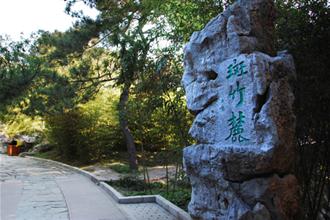 Poem for Banzhu Lane (Poem for Lane of Mottled Bamboos)
Poem for Banzhu Lane (Poem for Lane of Mottled Bamboos)
Banzhu (Phyllostachys bambusoides f. lacrima-deae), a precious bamboo species, is famous for the purple spots on its pole and thus becomes a favorite choice for people to decorate gardens. This poem was composed by a man by the name Shadi on the completion of Banzhu Lane, in which he lauded the enjoyment the lane had brought to its visitors, related the love of E’huang and Nuying for Emperor Shun and how Banzhu came into being.
-
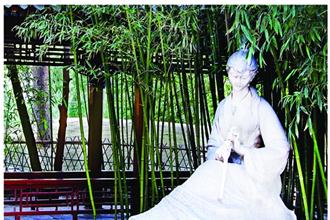 Mingyue Islet (Bright Moon Islet)
Mingyue Islet (Bright Moon Islet)
The islet is famous for the scene named Xiaoshengzuiyue, where winding stone lanes, trees, flowers and bamboos form a picture of enchanting beauty. Scattered amidst them are Daiyue Pavilion (Moon-Appreciation Pavilion), Buyue Corridor (Walking-on-the-Moonshine Corridor), Gutengjia (Ancient Vine Framework) and Xiaonv Jade-Statue (Jade Statue of Maid Xiao). In the west of the islet stands Wenyue Tower (Moon-Inquiring Tower) where the manmade rockeries and jingling springs are of enticing loveliness. When in the evening the moon rises, you, standing high on the tower, can appreciate the moon rising slowly in the sky while seeing in the water its reflection sinking deeper and deeper. You can also have fun climbing up the rockeries, listen to the crooning wind in Buyue Corridor or look up at the fairy who is said to be residing in the moon palace.
-
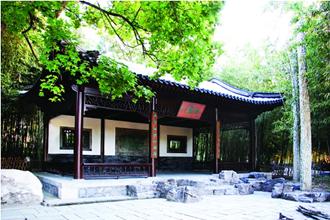 Qinglian Islet (Green Lotus Islet)
Qinglian Islet (Green Lotus Islet)
A joining Biboliantang (Rippling Lotus Pond), Qinglian Islet is a hillock connected by three bridges named as Mei (Plum), Lian (Lotus) and Hong (Iris). On the islet pines, bamboos, beautiful flowers and many other rare trees or grasses are thriving in luxuriance. Standing in Liancui Pavilion (Verdure-Embracing Pavilion) atop the hill, you can enjoy a panoramic view of the whole islet. In front of the hill stands Bayi Pavilion (Pavilion of All Pleasantness) where you can appreciate ancient Chinese paintings among the elegant bamboos. On the stones scattered in this verdurous world are carved four pictures symbolizing respectively Rain, Snow, Wind and Frost, and a seal and a prose On Bayi Pavilion. Inside the Pavilion there permeated an atmosphere of ancient wisdom where you can see inscribed poems or prose chanting the beauty of pines or bamboos. In front of the Pavilion a stone lane extends into distance, along which lofty rocks thrusting up into the sky. Strolling by the pond, you can take a rest on the lotus-shaped stands while appreciating the thriving lotus blossoms in the cool breeze. In summer days, you may go boating in the lotus pond from where the Qingluocui Islet (Islet of Verdure) can be seen upward while the lotus send off pleasant fragrance from time to time. Facing the pond stands the four-pillared Handan Pavilion (Lotus-Blossom Pavilion) inside which there are couplets in eulogy of the bamboo’s uprightness and the lotus’ purity.
-
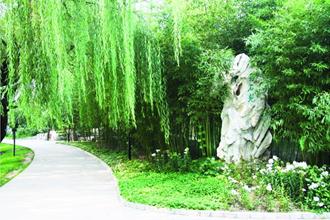 Yunshi Garden (Garden of Graceful Stones)
Yunshi Garden (Garden of Graceful Stones)
Located to the north of the Nanchang River, Yunshi Garden covers an area of 7.68 hectares. Surrounded by lovely hills and bubbling springs, the garden displays a rich variety in terms of topography. Trees and grasses here are arranged in artistic design while the exquisitely-built pavilions and corridors offer an ideal place for you to appreciate the beautiful scenery composed of pines, bamboos and unique stones. Inside the garden there are many scenic spots of particular charm, such as Qingliangyanxiu (Bright Scene of Refreshing Elegance) where you can enjoy the flying waterfall and craggy stones, Jiangnanzhuyun (Graceful Bamboos) in which the bubbling springs and brooks welcome you with their utmost beauty; Bieyoudongtian (Pleasant Surprise) where the bamboos are growing in luxuriance, the tranquil Youxianshanguan (Friendship Garden), Banzhu Lane (Lane of Mottled Bamboos) where the bamboos along the lane will send you their sincere greetings, Lvyun Pavilion (Green-Cloud Pavilion) where you can have a chance to acquaint yourself with the four Chinese traits (Strong-mindedness, Grace, Loyalty and Sincerity) and many other scenes, such as Zhiyi Cottage (Cottage of Chess), Lingtao Pavilion, Meitai, etc.
-
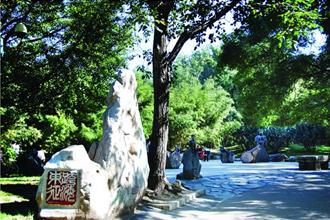 Kuahaizhengdong (Expedition Eastward across the Sea)
Kuahaizhengdong (Expedition Eastward across the Sea)
This is a group of garden sculptures with the Chinese chess culture as its essence. Chinese chess has long been a favorite game for Chinese people, which, although not difficult to learn, has embodied in itself many enlightening ideas and truth for you once you get to understand its essence better. It is said there remain eight great puzzles in Chinese chess playing since it came into being, one of which is Kuahaizhengdong (Expedition Eastward across the Sea). Embraced in such an environment of natural elegance composed of the pines, plum trees and bamboos, a large three-dimensional chess board is placed in the center surrounded by another seven small chess boards, all of which are aimed at carrying forward Chinese chess culture and providing an opportunity for all the chess fans to enjoy the fun of solving the ancient mystery. The eight great chess puzzles are namely Qixingjuhui (Gathering of Seven Stars), Qiuyinxianglong (Earthworm Conquering Dragon), Yemacaotian (Galloping Wild Horse across the Field), Qianliduxing (Thousand-Mile Journey in Solitude), Hongyanshuangfei (Flying of Swan and Wild Goose), Kuahaizhengdong (Expedition Eastward across the Sea), Hongmenyeyan (Hongmen Feast) and Jinjiduli (Golden Rooster Standing on One Leg).
-
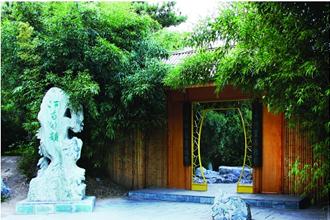 Jiangnanzhuyun (Graceful Bamboos)
Jiangnanzhuyun (Graceful Bamboos)
Situated on the northern bank of the Nanchang River, this garden is most famous for its unique scenes composed of bamboos and stones. Outside the gate is erected a single stone on which is inscribed the name of the garden. Once entering the garden you will see pines and bamboos in luxuriance, with stones of various shapes standing on craggy cliffs under which a small lake is rippling in the gentle breeze. Going down from the cliff, you will find yourself embraced by a verdurous world. Passing through the Shequ Gate (Gate of Fun) you will arrive at Xiangshanshuyu (Elephant Hill of Silvery Jade) where the springs flowing through the stone crevices and the mottled bamboos thrive among ragged rocks which have a very beautiful name “Yunmeng Xiangfei”(Concubine Xiang on Dreamy Cloud). Climb up the western side of the cliff, you will reach Zhaohui Pavilion (Sunshine Pavilion) where you can have a rest strolling among the lofty pines. Go eastward, you will soon find yourself in an idyllic world where the elegant bamboos cast gentle shade on the ground and several bubbling brooks flow. Green leaves, floating lotus, silvery waterfall and craggy cliffs compose a dreamy world of enchanting beauty. There are also other scenes here, such as Sanyoutingquan (Three Friends Listening to the Spring), Bashanningcui (Verdurous Hill), Weishangfenghuang (Bamboo in the River), and so on.